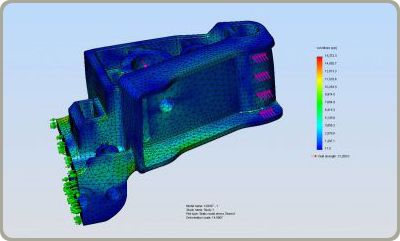If you’re new to manufacturing an injection-molded product (using plastic or other materials), it’s critical to realize the impact materials have on the design and manufacture of a product.
Case in point: Recently a company that sells outdoor/sporting equipment contacted us to ask if we could take an aluminum part used in one of their products and manufacture it in plastic. The company’s goal was to reduce the cost of their existing part.
Our engineering department uses Finite Element Analysis software to aid in coming up with solutions to these kinds of challenges. This software allows us to address very complicated problems by dividing them into small elements that can be solved in relation to one another. In this particular case, FEA (Finite Element Analysis) enabled our engineer to optimize the design of the molded part with as much stiffness as possible per material used. This presented a comparison of the molded part design to the aluminum part making it possible to select the proper material and show how the strength of the molded part would theoretically compare to the existing one.
In other cases we have been able to help a customer save money. For example, not long ago a customer asked us to use a high-end material for a product – 50% carbon fiber filled nylon with Teflon® – but we had concerns about being able to fill the part, achieving a uniform surface appearance, and cost to produce. Our engineers, working in conjunction with our materials suppliers, were able to suggest a 30% glass-filled nylon, which costs about 20% of the original high-end material we were asked to use at the start. In addition, the material we recommended lent itself to better cosmetics and even outperformed the high-end material in the customer’s drop testing.
There are many factors that have to be considered when selecting materials for manufacturing an injection-molded product to ensure optimum performance. They include part design (size and thickness, aesthetics, color, living hinge); cost; mechanical properties of the part (stiffness, tensile strength, impact strength, fatigue resistance); electrical insulation; thermal properties; welding/bonding; chemical resistance; and FDA compliance. If you have questions about material selection for an injection-molded product, please let us know.

